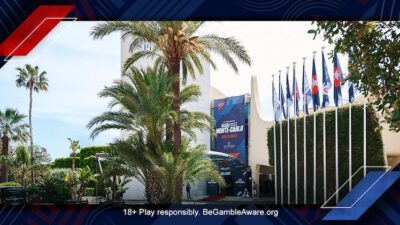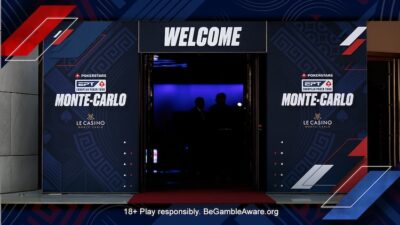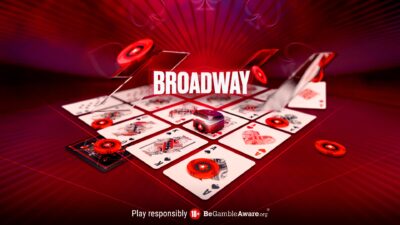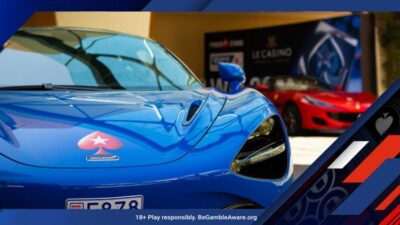Television coverage of the European Poker Tour is so slick that we take it all for granted. You probably don’t notice the camera operators, floor managers and producers busying themselves in the background of the pictures you watch — you’re not meant to; they’re all dressed in black after all. But just remember sometimes that you owe all of your enjoyment to them.
Thankfully, there are some people in high places who notice and judge the qualities apparent in television production. In the UK they go by the collective name of the British Academy of Film and Television Arts (Bafta), and every year they celebrate the best of the best in a prestigious awards ceremony.
Last week in London, eight of the crew who work for Sunset+Vine, and have also worked on EPT coverage for ten years, latterly for Tours Productions, won a Bafta for their work at the 2012 London Paralympic Games, which was broadcast on Channel 4 in the UK. It was no mean feat. Sunset+Vine was up against nominees that included coverage of the London 2012 Olympics opening ceremony, the so-called “Super Saturday” of the Games when Team GB won a raft of gold medals, and also the BBC’s coverage of men’s tennis final at Wimbledon.
“It’s the pinnacle of what we do,” said the director Daniel Hudson, talking to PokerStars Blog during a break in the Super High Roller coverage here. Hudson had allowed himself a moment’s respite from the heat and tension of the “truck”, where live images are cut and broadcast for EPT Live and subsequently become the full edited programmes on television and PokerStars.tv.
Hudson added: “People who work in sport TV spend hours and hours away from their families, you commit a lot of your life to it, and to be recognised is just a really lovely thing. There aren’t many levels of recognition within what we do, and the Bafta is the top.”
The Paralympics was also no ordinary production. Olympic fever swept through Britain last summer as the better known Olympic Games seized the imagination like no other sporting event in living memory. Many feared that the Paralympics, in the same venue in the week after the Olympic fortnight, could not be anything but an anti-climax. After Usain Bolt, Mo Farah, Bradley Wiggins and Jessica Ennis, what could possibly measure up?
This is where television can step in and ensure events get the billing and the coverage they demand and deserve.
“Essentially our role was bringing the Games to the people and explaining it in a different way,” Hudson said. “We personalised it for people, making people aware of the characters within each sport…We did two years of build up programmes really, where we got to know the faces as well. They were characters and athletes that we didn’t know, and disabilities that we were unaware of as well. Somebody with cerebral palsy, for example, their sport works in a very different way to, say, somebody with an amputation. We had to learn all those things as well.
“Even more importantly we had to learn how people with those disabilities wanted to be treated and talked about and dealt with. It was a real learning curve for us involved.”
Jo Hodges is a camera operator on the EPT, usually responsible for swooping in from the rail with a hand-held camera to bring pictures from the very nerve-centre of the poker action. She is the one who picks out the beating pulses on the side of players’ necks, or eavesdrops on the anxious conversations between families and friends. But during the Paralympics, where Hodges worked in the Bafta-winning crew as a studio camera supervisor, her innate curiosity and eye for the best shot combined with an evident passion for the Games themselves and a desire to tell a different, dramatic narrative.
“It was a privilege to work on it,” Hodges said, during an interview only interrupted by the necessity to watch Phil Ivey all in, doubling up. “We were just as excited as anybody else about the events that were going on…It was something new. It was trying to change people’s perceptions about things and I think it succeeded in that. I think that was due to everybody, however small or large their part in it. It was about everybody working towards that one goal.”
Hudson echoed the sentiment, highlighting the fact that the Bafta was awarded specifically to the whole production team, rather than specific individuals. He listed the names of each of the crew who missed the ceremony in London last week to work here around the poker tables of Monaco. Alongside Hudson and Hodges, Donna Tait, Lee Marriot, Liz Bell, Michael Burns, Dave Corfield and Liam MacLeod were also forced to forgo champagne and canapes for three-bets and bust outs.
“We’ve got a job to do here,” Hudson said, a level of commitment and professionalism that is greatly appreciated by others involved in the presentation of this tour.
“I’m really proud and feel very privileged to have such talented people work on the EPT TV production team,” said Louise-Ann Penrose, Head of Tours Productions, EPT TV & Webcast.
After a career that began on little known cable and satellite channels, cutting his teeth on some “really bad game-shows”, Hudson now finds himself visiting the most exclusive destinations in world sport and directing coverage of the very biggest events. He has directed two finals of the Uefa Champion’s League, watched by billions, and is now an old hand on the EPT.
“People think that poker is the easiest sport to do,” Hudson said. “But actually eight people sitting around a table, not really knowing when they’re going to talk — you want to get all that reaction, when they’re going to act and how they’re going to act — that’s the difficult bit.”
He added: “Football and rugby and ball sports, you’ve got one ball to follow. And as long as you’re concentrating on that, you’re pretty much telling the story. Well, around a poker table, the story could be just someone chipping a sentence in from one side of the table to another…You’ve sort of got to have eyes everywhere. That’s the important bit, conveying the relationships that happen around the table all the time. It isn’t just about the cards.”
The same was very much true at the Paralympics, where there was a background story so much more profound than the raw statistics of world records and medal tables. Through five shows a day, every day, the Sunset+Vine crew managed to bring the Paralympics right up to the standard expected of the very biggest sporting occasions in the world.
“We genuinely broke down boundaries,” Hudson said.”When we walked away, we really felt that we’d made a difference. We don’t get that chance very often. That’s what television should be about.”
Watch the latest from Monaco on EPT Live, home of the Bafta winners.
Back to Top






